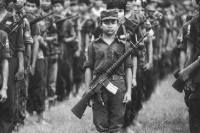Tale of the
child
soldiers in Burma
Human
Rights Watch
"Burma
has a poor human rights record, but its record on child soldiers is the
worst in the world," said Jo Becker, advocacy director of the Children's
Rights Division at Human Rights Watch.
Burma's
army has doubled in size since 1988, and with an estimated 350,000 soldiers
is now one of the largest armies in Southeast Asia. According to the accounts
of former soldiers interviewed by Human Rights Watch, 20 percent or more
of its active duty soldiers may be children under the age of 18.
The
220-page report, "My Gun was as Tall as Me: Child Soldiers in Burma,"
is the most comprehensive study of child soldiers in Burma to date. Drawing
on interviews with more than three dozen current and former child soldiers,
the report examines child recruitment by 19 different armed opposition
groups in addition to Burma's national army.
Recruiters
for Burma's army frequently apprehend boys at train and bus stations,
markets and other public places, threatening them with jail if they refuse
to join the army. The boys are given no opportunity to contact their families,
and are sent to camps where they undergo weapons training, are routinely
beaten, and brutally punished if they try to escape. Human Rights Watch
received several accounts of boys who were beaten to death after trying
to run away.
Once
deployed, boys as young as 12 engage in combat against opposition groups,
and are forced to commit human rights abuses against civilians, including
rounding up villagers for forced labor, burning villages, and carrying
out executions. Human Rights Watch interviewed two boys, ages 13 and 15
at the time, who belonged to units that massacred a group of 15 women
and children in Shan State in early 2001.
"Burma's
army preys on children, using threats, intimidation and often violence
to force young boys to become soldiers," said Becker. "To be
a boy in Burma today means facing the constant risk of being picked up
off the street, forced to commit atrocities against villagers, and never
seeing your family again."
Human
Rights Watch noted that there is no way to precisely estimate the number
of children in Burma's army, but it appears that the vast majority of
new recruits are forcibly conscripted, and there may be as many as 70,000
soldiers under the age of 18.

Children
are also present in Burma's myriad armed opposition groups, although child
recruitment is generally decreasing as many opposition groups have shrunk
in size and resources in recent years. The United Wa State Army, the largest
of the opposition forces, forcibly conscripts children and has the largest
number of child soldiers of the opposition groups. The Kachin Independence
Army also forcibly recruits children, and according to witnesses interviewed
by Human Rights Watch, is the only armed group in Burma to recruit girls.
Other
opposition forces, including the Shan State Army (South), Karen National
Liberation Army and the Karenni Army, have stated policies against recruiting
children under the age of 18, but appear to accept children who actively
seek to join their forces. Although many armed opposition groups have
ceasefire agreements with the government, children in opposition forces
may also participate in combat, sometimes with little training.
"The
international community has increasingly recognised the use of child soldiers
as unacceptable," said Becker. "Burma's armed forces and groups
must immediately stop recruiting children, and demobilise all children
in their ranks."
International
law prohibits government forces or armed groups from recruiting children
under the age of fifteen. Such recruitment has been recognised as a war
crime under the statute for the International Criminal Court. In 2000,
the United Nations General Assembly adopted an optional protocol to the
Convention on the Rights of the Child that raised the minimum age for
participation in armed conflict to 18, and prohibits all forced recruitment
of children below age 18. Burma is a party to the Convention on the Rights
of the Child, but has not yet signed and ratified the optional protocol.
The
International Labour Organisation convention on the worst forms of child
labour, adopted in 1999, also recognises the forced recruitment of children
under age 18 for use in armed conflict as one of the worst forms of child
labour.
Human
Rights Watch called on Burma's army and all armed opposition groups to
immediately end all recruitment of children under the age of 18, and to
demobilise all children currently serving as soldiers. It urged the government
and armed groups to cooperate with international agencies such as UNICEF
to reunify former child soldiers with their families and facilitate their
rehabilitation and social reintegration.
Human
Rights Watch also appealed to other governments to strongly condemn the
recruitment and use of child soldiers by the Burma government and other
armed groups, and to use diplomatic and other appropriate means to end
the use of child soldiers in Burma.
Human
Rights Watch is a US based human rights body.
.